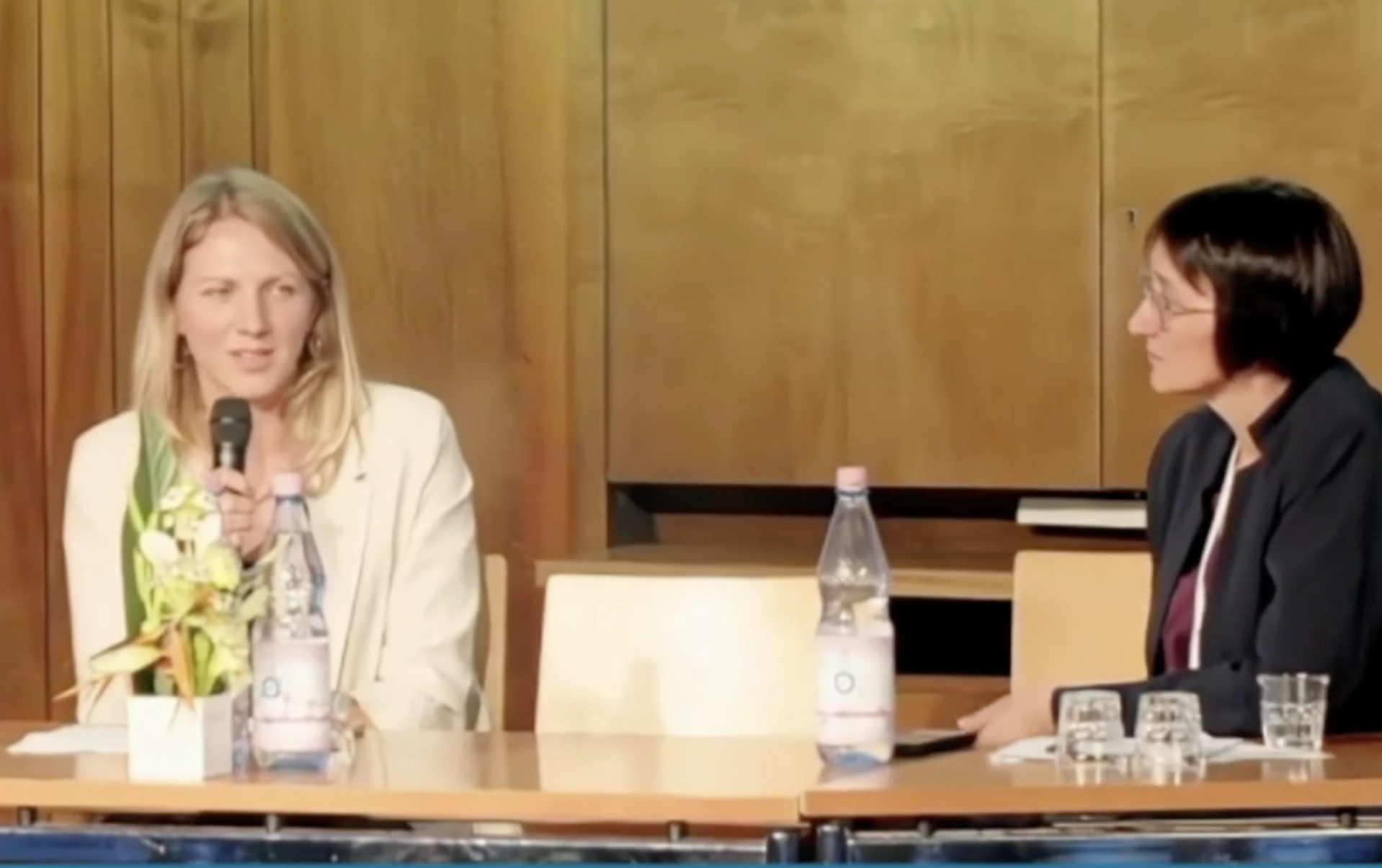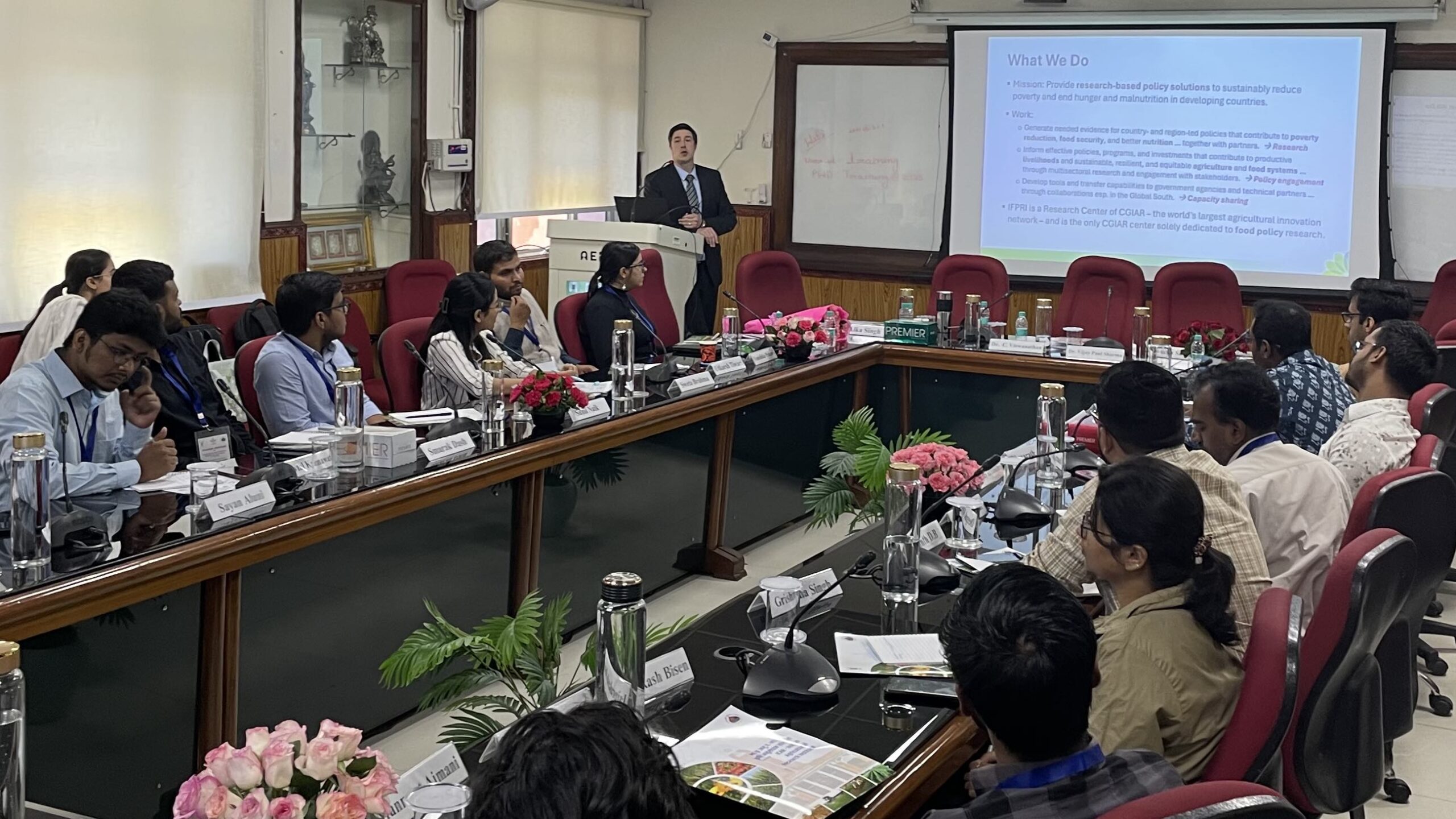Globally, five out of six farms are operated by smallholders who produce around one third of the world’s food. These farms provide a wide range of additional ecosystem services, such as carbon storage, pollination, and cultural and supporting services. Yet smallholder households face continued and often growing challenges to making a living, and are the poorest and most food-insecure populations in low-and middle-income countries. Evidence suggests that payments for ecosystem services (PES) can diversify smallholder earnings and incentivize more sustainable farming and land management practices. A September 21 panel discussion at the Tropentag 2023 conference in Berlin, organized by IFPRI, CGIAR, and Germany’s Federal Ministry for Economic Cooperation and Development (BMZ), focused on the challenges and opportunities of PES.
Moderator Claudia Ringler, Director of IFPRI’s Natural Resources and Resilience Unit, set the session’s tone by highlighting the significance of PES. Johann Swinnen, IFPRI Director General and Managing Director of the CGIAR Systems Transformation Science Group, emphasized the pivotal role of PES in the transformation of food systems. Swinnen said that the limited application of PES thus far can be attributed to complexities associated with measurements, information availability, implementation, and enforcement. He stressed the necessity of moving beyond theoretical discussions to gain a practical understanding of how PES can enhance the resilience of food systems.
PES overview: What, where, and how?
Marcela Quintero, Associate Director General of Research Strategy and Innovation for the Alliance of Biodiversity and CIAT and Senior Director of the CGIAR Food Systems Transformation Science Group, outlined three key defining aspects of PES: Voluntary negotiations between providers and users, well-defined rules and conditions for natural resource management, and the transfer of resources among social actors. Furthermore, land tenure, willingness to pay or accept payment, and institutional and organizational capacity play vital roles in the success of PES, although research gaps remain regarding evidence of socio-economic benefits.
There are also gaps in program design that need addressing, Quintero said, including the need to establish differentiated payments to compensate for the cost of ecosystem service provision, and better ecosystem service modeling to define the activities and benefit streams that serve as the basis for payments. Targeting the service providers is also crucial during program set up. Moreover, there is a continued lack of monitoring and enforcement during implementation. But these issues can be addressed. One positive example is Peru, where the establishment of a formal PES framework and the enforcement of laws related to payment collection helped drive progress.
New paradigm for PES schemes
Felicitas Röhrig, BMZ Senior Policy Officer, Division of Sustainable Agricultural Value Chains, International Agricultural Policy, Agriculture, Innovation, addressed the current challenges known as the “3Cs”—climate change, the COVID-19 pandemic, and conflict—affecting global food systems. She emphasized the necessity for a paradigm shift, particularly due to the vulnerability of smallholders in the Global South to these shocks. These farmers provide valuable ecosystem services but are not adequately rewarded for their contributions.
Röhrig emphasized the importance of creating opportunities for them to generate income based on the positive externalities of their activities and their invaluable roles in climate protection and food security. She introduced a new PES program called CompensACTION, supported by the German government with the joint goals of supporting income generation and environmental sustainability. The program has started operations in Brazil, Ethiopia, and Lesotho.
Lessons learned from carbon markets
Steven Lawry, a Senior Associate at CIFOR, said that REDD+ (Readiness for Reducing Emissions from Deforestation and Forest Degradation) programs and PES interventions have proven difficult to implement in the context of community forestry. Successful stewardship—as practiced in many community forestry schemes—hinges on several fundamental elements, he added, including the ethic of care, intrinsic knowledge of the context, and agency.
Lawry noted that PES schemes, such as voluntary carbon markets, were instead rewarding poor forest stewardship or “deforesters” as the programs have to show additionality or improvement over current practices, while schemes with good management—challenged to show additional ecosystem services—received no support. In situations where there is already a high level of stewardship with an optimal social and ecological carbon balance, the implementation of PES programs can therefore be socially unacceptable. To address this, Lawry suggested that directing investments toward the enhancement of social and environmental well-being and toward rewarding good forest stewardship may be a preferable course of action in such cases.
Insights from Africa
Amos Wekesa, a carbon specialist with the Global Evergreening Alliance (GEA), highlighted several significant challenges in implementing AFOLU (Agriculture, Forestry, and Other Land Use) projects, including high entry and initial costs, the absence of adequate measurement tools, issues related to non-permanence and leakage, concerns regarding certification, and uncertainties in policies. To mitigate transaction costs associated with service provision, Wekesa recommended aggregating farmers into groups. Additionally, he emphasized the importance of tailoring extension services to local contexts and underscored the value of training of trainers (TOT) programs for lead farmers, as well as the adoption of digital systems to enhance the effectiveness of these services. He noted that it was important to plant more trees than needed for carbon payments to ensure tree availability for livelihood needs and to generate understanding of local perceptions around tree species, as local taboos make it easier to protect some and more challenging to protect other trees from cutting.
Wekesa also noted a lack of evaluation of the benefit streams (and costs) of older and past carbon market projects, which prevents learnings for new programs.
Insights from India
Pranab Choudhury, with the Center for Land Governance and the Foundation for Ecological Security (FES), advocated for adopting a systems approach, rather than a linear and commodity-based one, when aiming to achieve mutually beneficial solutions in PES. In this context, he emphasized the strategic importance of focusing on communities and on bundling services. For instance, in Meghalaya and Odisha, forests are seen not only as sources of food and medicine but also as providers of timber, fuel wood, non-timber forest products (NTFPs) for livelihoods, watershed, and nutrition services, and even as social and recreational spaces through forest paths. Potential risks arise if a linear and commodity-centric approach is adopted in such settings, he said, including reduced employment opportunities and increased resource extraction, such as stone quarrying and timber harvesting. He called upon the joint assessment of all interventions from an economic, social and ecological perspective, as is reflected in the stewardship approach of FES.
The way forward
The ensuing discussion focused on ways to fairly compensate farmers who are already engaged in good practices and provide adequate support for those communities that would like to improve management. Quintero highlighted an example of a shift toward rewarding existing water resource conservation in Peru through government legislation. Lawry supported the idea of recognizing long-term investments toward sustainability through legislation and other means. He pointed out that in communities with systemic challenges related to conservation and management, farmers may lack the social and institutional conditions needed to respond to incentives. In such cases, he argued, a sustained adherence to conservation practices was unlikely. He suggested reframing “payments” to “investment” to increase local social capacity for resource management and community well-being.
Röhrig suggested that public funding can be utilized in projects where business cases are not applicable to enhance the sustainability of PES schemes. In the context of pre-financing transitions for smallholders into agroforestry, Röhrig proposed that offering loans can help alleviate the financial risk for farmers.
Regarding future research priorities, the speakers highlighted the need for an increased research focus on biodiversity implications of PES schemes, participatory action research to enhance community involvement, benefit-sharing, and on investment in social and ecological aspects as key agenda items.
Mary Grace Barbacias is an MS student at the University of Bonn and a consultant with the International Rice Research Institute. She is part of Tropentag 2023’s team of 12 student reporters, representing diverse backgrounds from across Europe. Through their camera lenses and pens, these reporters amplify the reach of scientific research and expert insights from the conference. Tropentag, an annual international conference established in 1997 and organized by ATSAF e.V. in collaboration with European universities, centers around research in tropical and subtropical agriculture and rural development (www.tropentag.de). This post also appears on the Tropentag blog.
This session was the second installment of the IFPRI-BMZ-CGIAR Policy Webinar Series titled “Payments for ecosystem services: win-win solutions?.







